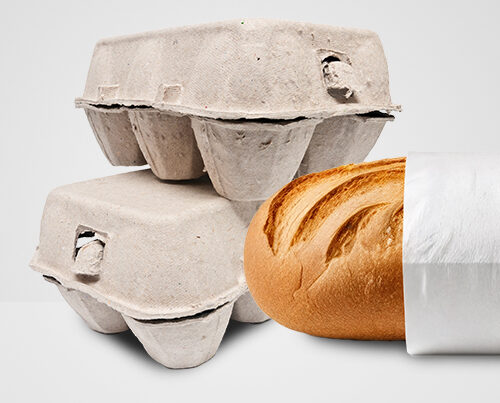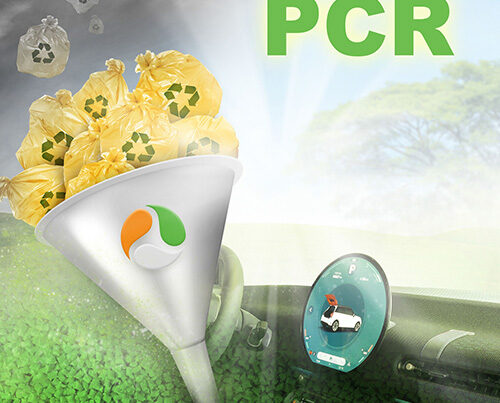Things got serious around a year ago: a statutory amendment came into force in Germany on 01 January 2023 making it obligatory for restaurants, cafés, canteens and other businesses selling takeaway food and drinks to offer their customers reusable as well as single-use packaging for their to-go products. One year on and the results are sobering. Many takeaway dishes continue to be sold in packaging that ends up in the bin just a few minutes later.
We decided to discuss this topic with two experts from REMONDIS Resource Management GmbH: Managing director Roland Lenders and sales manager Johannes Hatting – both avid campaigners for sustainable solutions for reusable to-go packaging – told us about some of their latest projects and how this market is likely to develop.
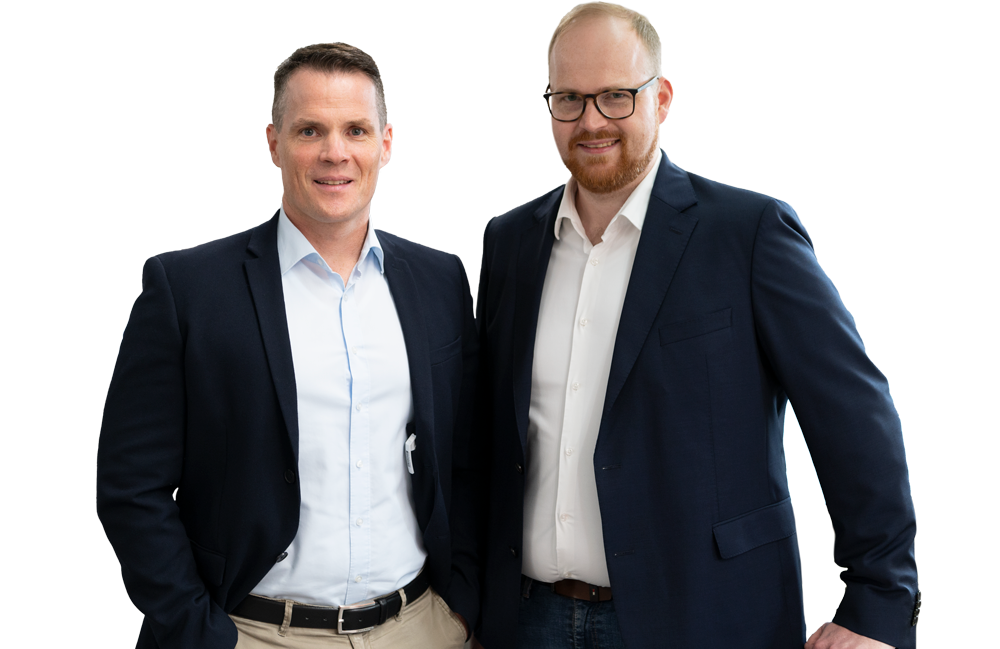

Reusable packaging for takeaways a must since 2023
All businesses selling takeaway, ready-to-eat food in plastic, single-use packaging and/or drinks in single-use cups have been obliged by law to offer their customers alternative reusable packaging since 01 January 2023. This new law does not apply to businesses with five or fewer employees and a sales area of less than 80m². If requested, though, these businesses must use bowls brought in by their customers for their takeaway food.
REMONDIS AKTUELL: Mr Lenders, what proportion of the to-go packaging used in Germany at the moment is reusable? How many people opt for reusable rather than single-use packaging when ordering their takeaways?
Roland Lenders: Unfortunately, it’s not very high. According to the latest WWF figures, reusable packaging made up a mere 1.6% of the products sold in restaurant businesses in 2023. That’s double the amount compared to the previous year but it’s not really having a noticeable impact on the bins in pedestrianised areas. Another reason for this is because the number of single-use packaging handed out during the same period increased from 13.6 to 14.6 billion. Every piece of reusable packaging that is reused by customers helps conserve valuable natural resources and energy.
REMONDIS AKTUELL: So why do so many people still opt to use single-use rather than reusable packaging?
Roland Lenders: The vast majority of businesses selling takeaway food and drinks comply with the legal obligation and offer the reusable alternative. However, this is usually not actively advertised, for example by staff, and is not accepted by guests.
Even if reusable packaging is offered, many people still prefer to use single-use packaging. For some, it seems to be the more convenient and hygienic option. Others lack the necessary information. Sales staff need to provide more consistent information, for example by addressing customers personally at the point of purchase.
Of course, there are still smaller businesses that do not adhere to the rules, but these are not really monitored by the authorities. Checks are mainly carried out by Environmental Action Germany (DUH) with test purchases at the large retail chains.
Johannes Hatting: This all shows, though, that the market for reusable packaging is still too complicated. At the moment, there are too many businesses offering their own stand-alone solutions. This means there’s a lack of incentive for consumers to opt for reusable packaging as they can’t use it everywhere. There is certainly still plenty of room for improvement here.
REMONDIS AKTUELL: Here at REMONDIS, you’ve been focusing on the subject of reusable to-go packaging for a good while now and currently specialise in services for the events sector. How did that come about?
Johannes Hatting: Experience has shown us that reusable to-go packaging already works well at events as the right conditions are in place. Take football stadiums as an example: football fans are used to buying their drinks in reusable cups – and have been for a long while – simply because single-use cups are no longer offered. We’re looking to make the most of this potential and further extend it. What’s really important is to discuss this with those working in the industry. By doing so, we get to understand their needs and can develop bespoke logistics concepts and services together with the event organisers.
Roland Lenders: Some local authorities, such as Düsseldorf city council, have gone a step further and are calling for events held on public grounds to only use reusable to-go products. We are currently working together with our colleagues from AWISTA to implement a concept that will see reusable to-go products used during Düsseldorf’s street carnival.
REMONDIS AKTUELL: So where have you already successfully used reusable to-go products?
Johannes Hatting: At the Berlin Marathon in September 2023 for example. The drinks stations handed out reusable cups for the first time. These cups were specifically developed for sports events and priority was very much put on safety. The new reusable cups are easy and safe to use. They can’t become a trip hazard as they have six points built into them so that they break if someone accidently treads on one.
The bins for collecting the reusable cups had a target board attached to them to make it easier for the runners to ‘hit the target’ while they ran past the bins. All in all, we handed out 90,000 reusable cups and collected them after they‘d been used. Our colleagues at REMONDIS’ Berlin branch were a great help here.
Political developments
There have been a lot of political developments regarding reusable to-go packaging – whether it be at European level with the PPWR (a Europe-wide packaging regulation that is currently being debated in Brussels) or at local level (such as the introduction of a local packaging levy in the German city of Tübingen).
And more developments are in store for 2024: a levy was introduced for single-use cups on 01 January 2024. Germany’s Single-Use Plastics Fund Act (EWKFondsG) has made it obligatory for manufacturers to cover the costs of collecting single-use plastic to-go packaging that has been discarded in streets and parks. The firms must pay a levy to the Single-Use Plastics Fund, which is based at the Federal Environment Agency (UBA). This means that companies must pay, for example, 1.236 euros for every kilo of single-use cups they place onto the market. This revenue should then be used to finance the collection and recycling of this packaging – work that is carried out by local and city councils.
REMONDIS AKTUELL: So what happens to the reusable to-go products once the event’s finished?
Johannes Hatting: They’re first taken to our sorting and washing centre. This is where we count and sort them, settle the deposits and manage the data. The cups are cleaned in our washing facility – this was built specifically for cleaning these reusable to-go products – and then dried straight away. Our focus here is not only on achieving the highest levels of hygiene but also on delivering quality and on conserving resources.
REMONDIS AKTUELL: And how do you manage to do that?
Johannes Hatting: For a start we have solar panels on our roof so that we can produce green energy. And then we have a sustainable system for recovering waste heat. What’s more, we ensure resources are used responsibly during the actual washing process itself. Just 30ml of water are needed to wash each individual cup.
Each cup goes through a quality management step after it’s been washed. This ensures that only intact and undamaged cups are sent for reuse.
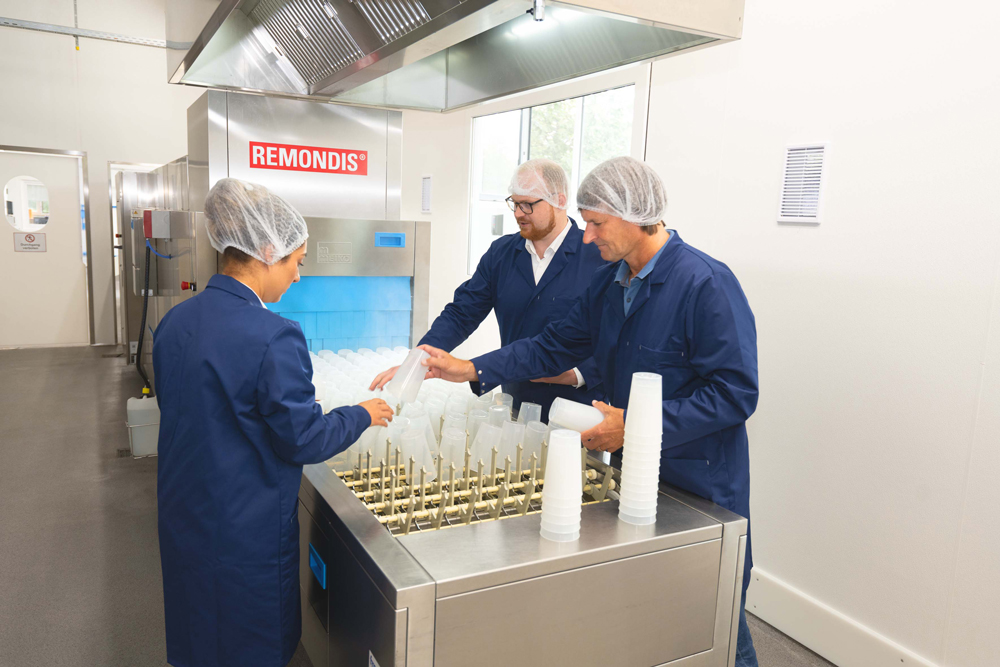
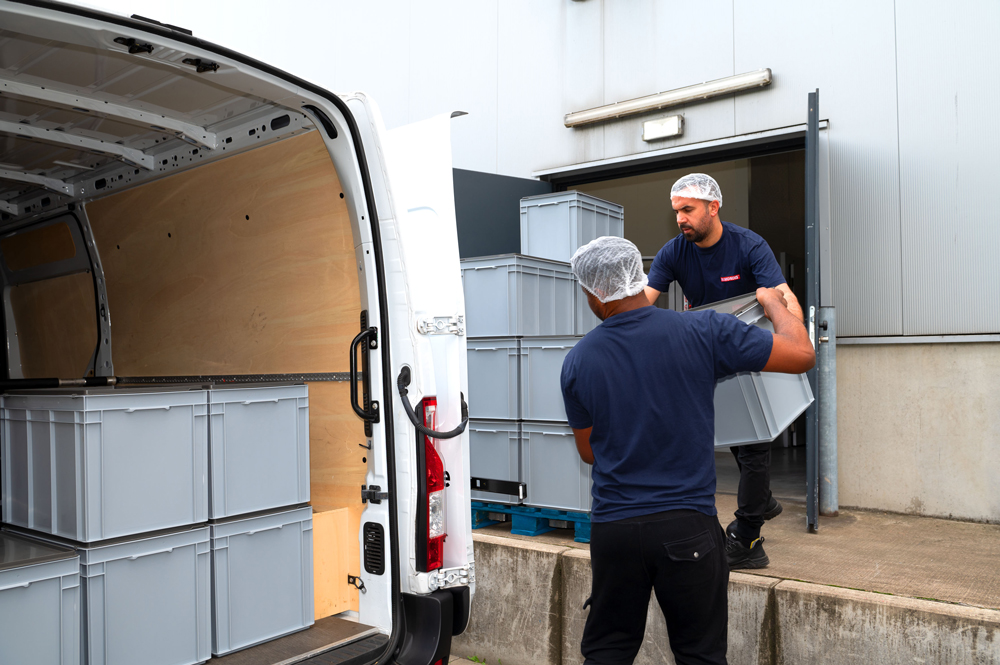
REMONDIS AKTUELL: Have you got any other examples beyond the events sector?
Johannes Hatting: Many people still tend to choose single-use cups when they buy their coffee-to-go simply because they can. Having said this though, the restaurant business is making progress in this area and we’ve had some successes in this field as well – in particular, our collaboration with McDonald’s. The logistics and supply chain specialist HAVI and McDonald’s Germany have sat down with their suppliers and developed a nationwide solution enabling reusable to-go packaging to be offered at its approx. 1,450 German restaurants. We’re responsible for the washing logistics and sorting tasks within this system.
Roland Lenders: We carry out the washing process at our sorting and washing centre as not all of the McDonald’s restaurants have suitable washing facilities on their premises.
McDonald’s new reusable to-go packaging system was recently presented with the ‘German Award for Sustainability Projects’ [Deutscher Award für Nachhaltigkeitsprojekte] in the ‘packaging solution’ category. We’re really proud to be part of this project.
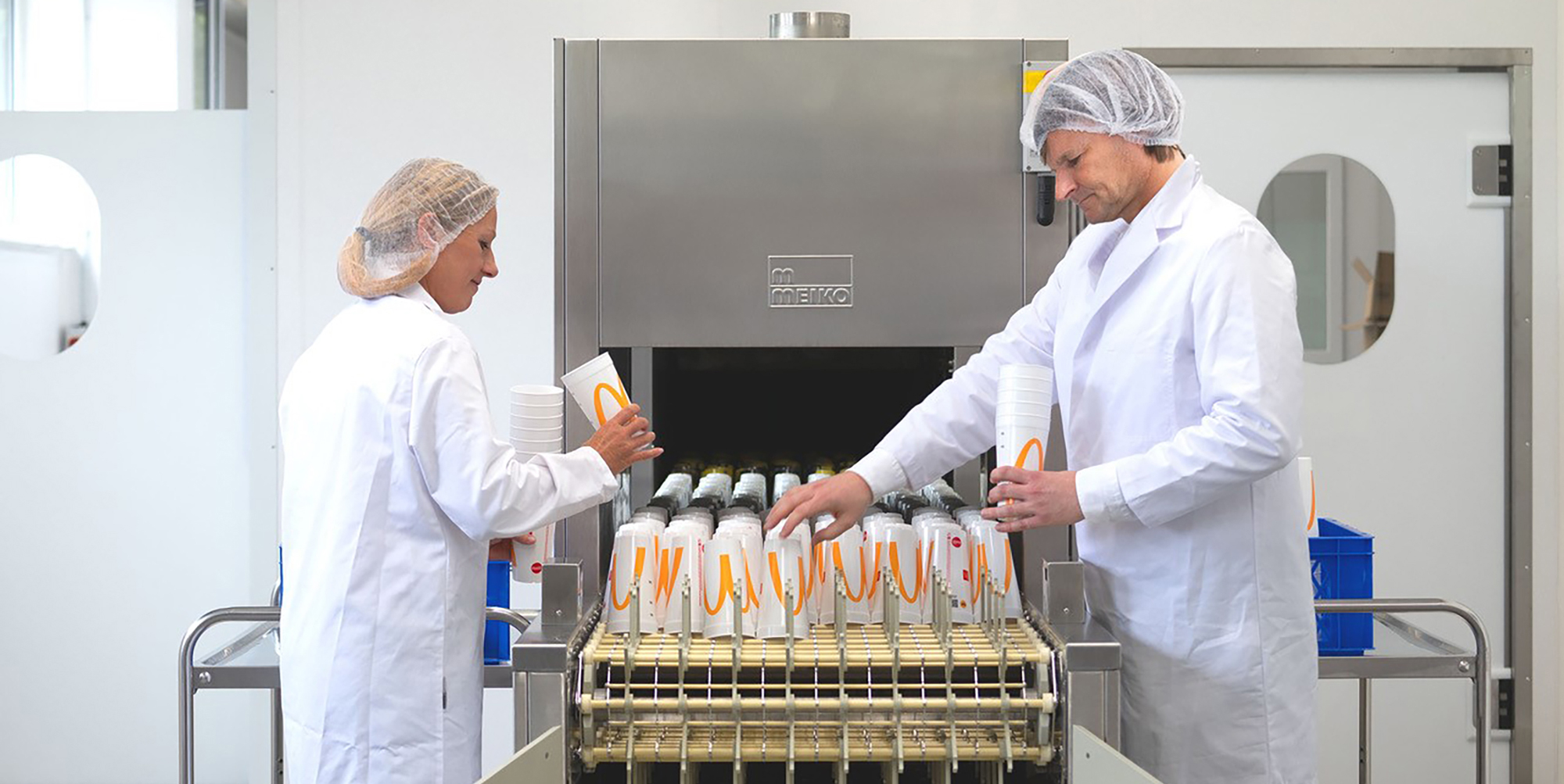
REMONDIS AKTUELL: How do you see the subject of reusable to-go packaging developing in the future?
Johannes Hatting: We’re operating in a very dynamic field with many different players. At the moment, there is a lack of statutory regulations in some areas but politicians are looking into this subject in great detail. We’re very much looking forward to seeing what direction this particular subject will take. What’s important is to prepare for the future now and develop solutions that can be implemented across a whole range of different sectors. One thing that’s certain is that everyone across the board will have to use reusable to-go packaging sometime in the future.
We set the course for the future when we began operating our sorting and washing centre in January 2023. We’ve been carrying out a whole number of tests here with our customers and the findings will be useful for the future.
Roland Lenders: Our big advantage is that the REMONDIS Group has a strong network. As we set up reusable to-go packaging schemes, we will be able to make the most of the expertise gathered from the Group’s deposit return scheme for drinks containers as well as of its experience of recycling plastic. We see reusable to-go packaging as an important piece of the puzzle and are very much enjoying expanding this particular field of business.
What’s more, there have been some encouraging findings about the reusable to-go packaging sector based on behavioural research. Among other things, it could become standard practice for menus to only offer reusable cups and to eliminate the disposable alternative altogether. If restaurant systems join in this trend and create incentives for their customers to use reusable packaging, we have the right cleaning and logistics system for this.
REMONDIS AKTUELL: Many thanks for taking the time to speak to us. Here’s wishing you every success with your reusable product schemes!
Find out more at: www.remondis-mehrweg.de
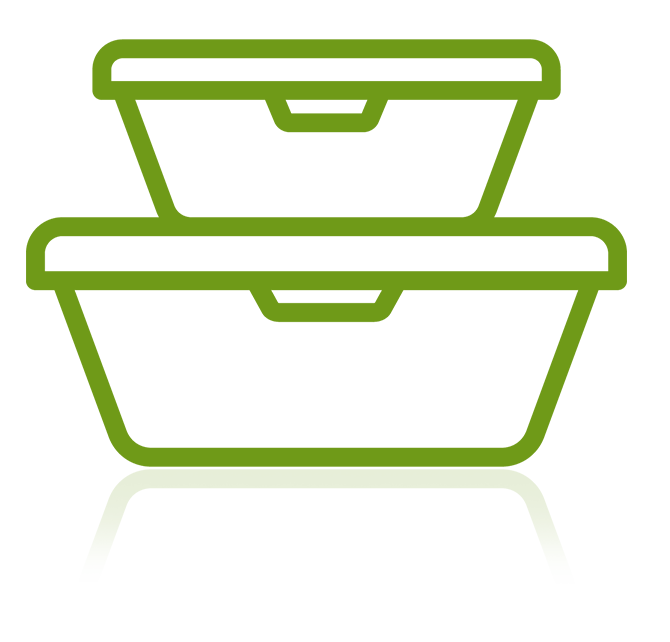
Image credits: image 1: Adobe Stock: jaochainoi; image 2, 4, 5, 6: REMONDIS; image 3: Adobe Stock: Monstar Studio








